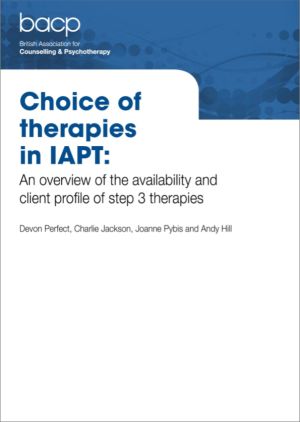Using data collected from the second round of the National Audit of Psychological Therapies (NAPT), published 2013, this report aimed to answer the questions:
- to what extent does choice of therapy exist within the IAPT programme?
- are clients accessing the different psychological therapies in IAPT comparable in terms of their demographic profile, diagnosis and number of sessions attended?
Key findings
Despite CBT, counselling, IPT, couples therapy and psychodynamic psychotherapy all being NICE-recommended interventions for the treatment of depression in adults, only one of the 114 IAPT services included in this analysis offered all five therapies. This suggests the IAPT programme is failing in its intention to provide a choice of the full range of evidence-based therapies.
While a level of choice exists for clients of some services, collectively the availability of IPT, psychodynamic psychotherapy and couples therapy in England is low.
Female and older clients are proportionally more likely to undertake counselling compared to CBT, suggesting these therapies may be meeting the needs of different groups. Further investigation may help services target therapies towards the client groups that find them most acceptable.
The average number of sessions was significantly lower for counselling compared to the other four therapies. This may indicate that counselling is more efficient than other therapies, or be a product of other factors, such as clients being less distressed at intake.

